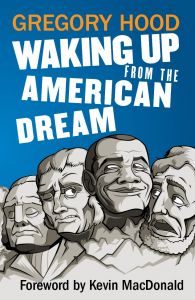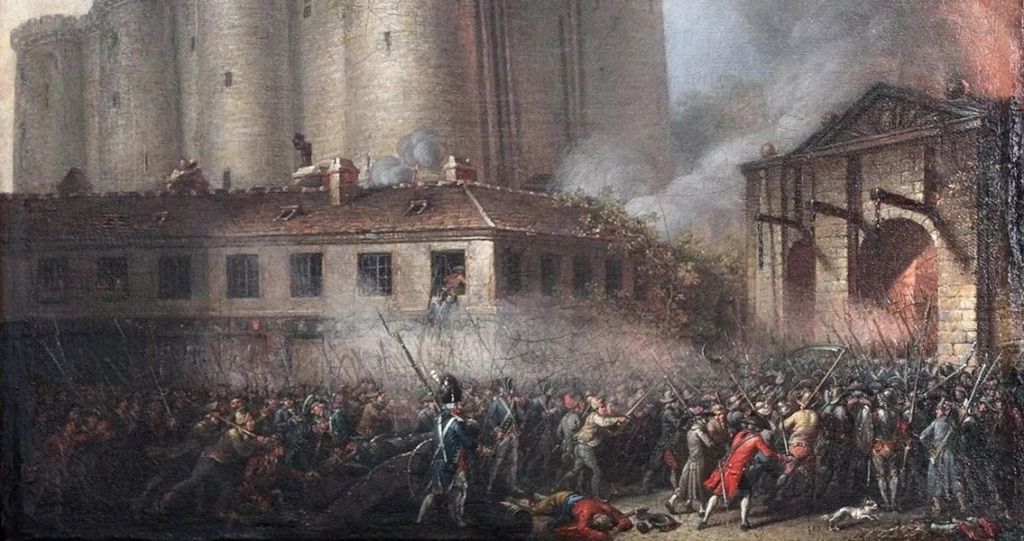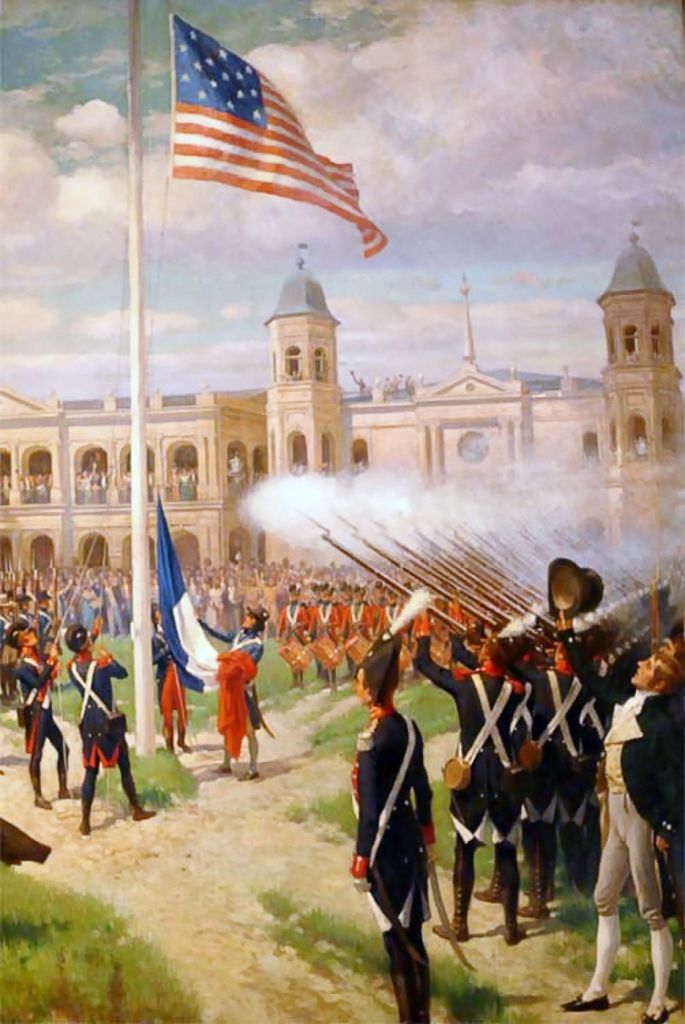Seth David Radwell
American Schism: How the Two Enlightenments Hold the Secret to Healing Our Nation
Austin: Greenleaf Book Group Press, 2021
It is no secret that the American political scene is polarized. The last two election cycles have brought considerable political violence — most fueled by the Democratic Party and its mainstream media enablers. Recently, Seth Radwell, a Manhattan businessman, took several years off work to write a book that explores this divide.
Radwell argues that America’s political divide goes back to the Enlightenment. The Enlightenment started in Western Europe as early as the 1670s, arguing for greater participation in government by the people, the rejection of religious explanations for otherwise mysterious matters, the seeking for answers based on science, and so on. Proving that an institution’s foundations are undermined while it is still at its height, the ideas of the Enlightenment began to be disseminated during the time of absolute monarchy in Europe, when the sectarian bloodbath of the Thirty Years’ War was still within living memory.
One can read a great deal about the French, Scottish, English, and other accounts of the Enlightenment, but Radwell says that nationality doesn’t matter. Rather, the most important aspect of the Enlightenment is the division within it between radicals and moderates. The radicals were willing to bring everything down to achieve their utopian goals, while the moderates only sought possible reforms at the margins — fixing that which could be fixed but doesn’t break something else.
Radwell writes that
[t]he split between the Moderate and Radical Enlightenment thinkers was of huge historical significance in France and . . . in America. While at first the split was only polarizing, the schism became permanent after the storming of the Bastille in 1789. In the ensuing conflict, remaining neutral was not a viable option. The Moderates lined up in support of the existing monarchy (albeit with new controls), while the Radicals advocated for an entirely new system. “The Bastille’s fall thus exacerbated but also clarified the long-standing rift between the two now openly competing Enlightenment wings. (p. 84)
John Adams & the Moderates
In the early United States, the moderates were best represented by John Adams, Alexander Hamilton, John Dickinson, and George Washington. The radicals were best represented by Thomas Jefferson, Thomas Paine, and Benjamin Franklin.
John Adams was a consistent moderate throughout his career. His first splash on the national scene was when he successfully defended the British soldiers who participated in the “Boston Massacre.” In that trial, Adams argued that the soldiers were right to defend themselves. His closing arguments were not much different from those used to exonerate Kyle Rittenhouse. Radwell writes:
Thus, in the mid-1770s, while Adams and many other colonial leaders were striving for a higher level of autonomy for the colonies, they were doing so fully under the auspices of this existing British constitution, which had well-defined provisions for governing the remote parts of the British Empire. This was the colonial leaders’ existing frame of reference. Interestingly, in interpreting the writings of John Adams, many modern readers have confounded references to “violations against the Constitution,” believing Adams was referring to the Constitution of the United States, which of course had not yet been written. In fact, Adams was referring to violations against the British constitution that had been established after the 1688 Glorious Revolution. Similarly, in Adams’s writings, many mentions of “The Revolution” referred to the same English Glorious Revolution, not the American Revolution, as many modern-day readers suppose. Therefore, since colonial leaders had the British mixed-government model as their frame of reference, the accusations against the Crown for which they demanded redress emphasized a failure to apply the principles of Britain’s own constitutional monarchy to the American colonies. (pp. 89 & 90)
Alexander Hamilton famously supported complex financial institutions, paying off debts to large central banks, and protecting industry through tariffs. He would prove to influence George Washington through the first President’s two terms, and he would influence — albeit in a tenser way — John Adam’s presidency.
Jefferson & the Radicals
Thomas Jefferson was the ideological polar opposite of Adams and Hamilton. He wholeheartedly supported the Radical Enlightenment and helped write the French Revolution’s Declaration of the Rights of Man and of the Citizen. Jefferson’s religious freedom bill in Virginia has come to be seen as liberating for the dissenting radical Protestants settling in western Virginia in colonial times — but his primary goal was freedom from religion.
The Declaration of Independence, although edited by others, was written by Jefferson. The document was filled with Radical Enlightenment ideas, especially the “equality” clause and the use of the term “Creator” rather than “God” or “Divine Providence.”
Thomas Jefferson needs a critique from the Right. Wilmot Robertson wrote of Thomas Jefferson:
Perhaps more than any other American, Jefferson must assume the responsibility for loading American democracy with the ambiguity and cant that have pursued it down to the present day. When one of the largest slave owners in Virginia solemnly writes, “all men are created equal,” either his semantics or his integrity must be called into account. What Jefferson and most of the other signers of the Declaration of Independence meant by equality was that English colonists had the same natural right to self-government as the English in the mother country. But that is not what they wrote. And it is what they wrote that, carried forward to another century and used in another context, has proved to be such an effective time bomb in the hands of those who advocate projects and policies totally antithetical to Jeffersonian democracy.[1]

If Pickett’s Charge was the price the South paid to get Robert E. Lee, “all men are created equal” is the price America paid for Thomas Jefferson.
Robertson wrote of Radical Enlightenment Pamphleteer Thomas Paine:
Thomas Paine deserted his wife and then filed for bankruptcy. Next he deserted his country, England, went to America, then returned to Europe, where he helped stir up the revolutionary terror in France. In 1796 Paine accused Washington of treachery, a libel which in no way has shaken Paine from his lofty pedestal in the modern liberal pantheon . . .[2]
Thomas Jefferson was a contradictory man. His remarks about sub-Saharans in Virginia are no different from what one might find at American Renaissance. His political success was probably due more to his ability to play political hardball and his support for white expansion in North America than his Radical Enlightenment ideology. Jefferson was stunned to see the French Revolution devolve into a bloodbath.

Radwell claims that Jefferson’s opposition to the Alien and Sedition Acts was a key factor that got him elected. It may have been Jefferson’s pro-white actions that proved the winning issue. Once in office, Jefferson accomplished two important pro-white feats. The first was purchasing the Louisiana Territory for three cents an acre. The second was sending the US Navy and Marines to suppress Islamic piracy and slave raiding in North Africa.
Radwell argues that the French Revolution’s Reign of Terror was the result of Maximilien Robespierre harnessing reactionary, Counter-Enlightenment forces — including the clergy — against the French radicals rather than a flaw in his ideology. (I found this to be a bold claim, to say the least.)
The US Constitution is a product of the Moderate Enlightenment. Instead of “equality” and the “pursuit of happiness,” it favors “ourselves and our posterity” and “property.” Many of the Washington administration’s actions, outside of the Indian Wars in the Ohio Country, were driven by fears of a French Revolution-style explosion in America. The suppression of the Whiskey Rebellion and the Adams administration’s Alien and Sedition Acts were reactions to the Reign of Terror.
Radwell downplays these events in the United States, but political violence was a very real menace — especially, to use his term, Radical Enlightenment-inspired political violence.
A great deal of the book discusses the Enlightenment split in politics up to the Trump administration. There has been an oscillation between the Radical and Moderate wings that has crystalized in the Democratic and Republican parties. Radwell argues that Trump was so effective because he exploited the neoliberal globalist economic conditions that have wreaked havoc on so much of America’s industrial heartland and the white middle and working classes.

Deindustrialization and globalization are major factors in America’s current political situation. The impact of globalization and outsourcing was not widely noticed at first, but when industrialized China emerged as a global rival, supply chains could be disrupted by unseen forces and a broad swath of the population in the heartland became underemployed, as well as victims of opiate addiction and crime.
President Trump governed as a run-of-the mill Republican once he got into office. He roared loudly, but didn’t get as much done. Radwell attributes this to the “Conservative Dilemma.” This is when the economically-squeezed middle and working classes are fooled into voting for policies that favor the wealthy through the politicization of social issues. Radwell is on to something here. The Conservative Dilemma is a puzzle yet to be solved. Greater support for trade and industrial schools, industry and manufacturing in America, and tariffs will go a long way in solving the issue, however.
Healing the Divide

You can buy Greg Hood’s Waking Up From the American Dream here.
Radwell shows that Adams and Jefferson came to understand each other’s point of view in their old age, and there is something almost holy about the fact that these two political rivals both died on the same day: July 4, 1826. Much of the political tension in America today could be healed if each side would hear the other’s point of view. One group that Radwell endorses is Braver Angels, which is attempting to highlight the similarities between Americans and shore up the crumbling political center.
As you can well imagine, a book that attempts to accommodate both sides of an issue will draw some considerable criticism from either side. I’ll add mine here. Its weaknesses are that Radwell believes the mainstream media sees bureaucracies such as the Justice Department and the “intelligence community” as neutral agencies rather than as political players like the Praetorian Guard was in ancient Rome. He also thinks that sub-Saharans are being politically suppressed rather than what they really are: vastly overrepresented. He also blames the “Right” for violence, when it is clear that antifa and Black Lives Matter have been the most violent force since 2014.
His cues from the mainstream media cause him to focus on Trumps “lies,” so he misses the bigger lies. The Big Lie of the last two decades has already been executed: the second Bush administration’s “weapons of mass destruction” fraud. George W. Bush colluded with Jewish/Zionist neoconservatives, the “intelligence community,” and the mainstream media to invade Iraq to pursue Israel’s interests. The disasters which followed need not be recounted here. He also neglects the lies behind black police “victims” such as the late aspiring rapper Michael Brown and the sub-Saharan saint/career criminal George Floyd.
Finally, Radwell wishes to abolish the Electoral College and the Senate. While I instinctively support these institutions as the mos maiorum of my people (who were in Pennsylvania when the Constitution was written), I must recognize that a unicameral legislative body can more easily vote to make a white ethnostate a reality and establish a “white citizens’ militia,” which can then in turn be given more funding than the current Department of Defense. Miracles can happen in politics, after all! Oliver Cromwell’s greatest weapon was the Rump Parliament.
Apart from these criticisms, this book should be seen as an enormous vindication of our ideas. Radwell acknowledges that immigration is a problem and that America has a unique culture which is being harmed by open borders. While he doesn’t believe that the 2020 election was stolen, he does acknowledge that voting irregularities are an issue, and he offers some ideas to put things right.
Most importantly, he mentions the plight of the white working class. This is the central issue in American politics. Deindustrialization, the contempt and sneering directed at them by the elites of both parties, drugs, and criminal predation are enormous issues. Addressing them means addressing trade imbalances, economic inequality, and sub-Saharan crime. After all, it is working-class whites and white Hispanics who are victimized by African criminal predation more than anyone else. America’s biggest strides have always occurred when either segregation and/or the mass incarceration of sub-Saharans has been state policy.
* * *
Counter-Currents has extended special privileges to those who donate $120 or more per year.
- First, donor comments will appear immediately instead of waiting in a moderation queue. (People who abuse this privilege will lose it.)
- Second, donors will have immediate access to all Counter-Currents posts. Non-donors will find that one post a day, five posts a week will be behind a “paywall” and will be available to the general public after 30 days.
To get full access to all content behind the paywall, sign up here:
Paywall Gift Subscriptions
 If you are already behind the paywall and want to share the benefits, Counter-Currents also offers paywall gift subscriptions. We need just five things from you:
If you are already behind the paywall and want to share the benefits, Counter-Currents also offers paywall gift subscriptions. We need just five things from you:
- your payment
- the recipient’s name
- the recipient’s email address
- your name
- your email address
To register, just fill out this form and we will walk you through the payment and registration process. There are a number of different payment options.
Notes
[1] Wilmot Robertson, The Dispossessed Majority (Cape Canaveral, Fl.: Howard Allen Enterprises, 1981), p. 316.
[2] Ibid., p. 113.
Enjoyed this article?
Be the first to leave a tip in the jar!
Related
-
Stalin’s Affirmative Action Policy
-
Pour Dieu et le Roi!
-
Popcult Humor from Wilmot Robertson: Remembering Wilmot Robertson (April 16, 1915–July 8, 2005)
-
Doxed: The Political Lynching of a Southern Cop
-
James M. McPherson’s Battle Cry of Freedom, Part 2
-
James M. McPherson’s Battle Cry of Freedom, Part 1
-
The Worst Week Yet: March 31-April 6, 2024
-
National Socialism as a Magical Movement: Stephen E. Flowers’ The Occult in National Socialism




16 comments
Some of what is summarized about the book I agree with here. I think there were a lot of irregularities in the recent election but I don’t think it was stolen. I don’t see how Trump could’ve gotten the electoral votes necessary to win. Of course the MSM did push Biden into the White House.
I’m not sure at this point what could be done to “heal the national divide” though. It seems that with open borders, the Progressives are able to make real inroads at dis-assembling the Republic. Fox News just posted some sound clips of how migrants are being flown into America’s heartlands and released at night by anonymously-hired Federal Contractors.
No one, not Dems nor the GOP, seem to have any power to stop this. I guess also we may go to war to protect Ukraine’s borders? Now that’s something I can get riled up about. I wonder if I’m too old to enlist in the Mobile Infantry?
No power to stop it? Who the hell is in charge then?
As my username implies, I’m a mathematician and not super connected to the political or power world. Or at least I used to be until the USA found out how much better hiring Indians and Chinese was for all complex technical work: including defense projects.
I don’t think Biden’s in charge as he doesn’t seem coherent enough to frame and execute such a destructive policy. If he gets impeached, I don’t see a big change if Kamilla becomes Pres. She’ll become very unpopular publicly but the DNC will try to limit what she says in public to reduce the damage.
Maybe there’s some sort of malevolent, secret, Soros, or other Billionaire-funded, think- tank in Washington which have actually come up with these policy moves? It’s too well-thought-out to be just an accident.
What do you do in mathematics?
Here I’m a little discrete (no pun intended), but basically I solve lots of equations and do models in a field called computational fluid dynamics. This involves discretizing an area and by solving local events by which one can predict phenomena for a larger whole.
Lol
Interesting. I assume to get a book published by any mainstream house, one has to repeat platitudes about black oppression or trumpian dishonesty. It’s become a state ideology. It already was but now is being enforced more vigorously.
Many on the Right deride the Enlightenment. However, monarchists aside, much on the Right derives from what this article calls the moderate Enlightenment. The author discussed here doesn’t appear to sympathetic to the Right, and would probably throw in with the Left against us, should it come to that, but disentangling the strands of Enlightenment thought, and seeing how those various strands stand up in light of the three centuries or so that have elapsed since the Enlightenment, is a task that we ought to embrace. Counter-Currents would be a suitable venue for that project.
There is no version of ‘universal suffrage’ and 50%+1 ‘democracy’ that is safe for Whites in Lower North America. It does not matter if all immigration was stopped today and every illegal immigrant deported and never allowed to return, the damage has already been done.
Radwell wants to appeal to ‘conservative’ Whites to ‘fix America’ while, essentially, doing nothing to compensate White America for the damage that has already been done.
I don’t have an interest is ‘saving America’. I only have an interest is saving White America.
And, in the long run, that’s going to be local rule, community values and nullification, not an expanded House of Representatives that is composed of the ever-swelling non-White immigrants and their families who are brought here as ‘Magic Dirt Americans’.
Radwell can worry about how the anti-White, anti-working-class policies of the last 70+ years have created a ‘schism’. To me ‘schism’ sounds a lot like a necessary predicate for separation.
Excellent summarizing comment. As matters stand, white America (and planetarily speaking, the white race and its Western civ) will disappear, the only issue being whether it happens gradually via continuing demographically dilutionary immigration, miscegenation, and self-hating white + POC-racist-supremacist cultural delegitimation, ostracization and disregard, or in some more violent, explosive and sudden fashion. White America will only survive ethnoculturally via separation and new racial national sovereignty. That’s our goal; anything less as an aspiration is unacceptable.
Of course, that distant goal will never be realized if we simply abjure politics. And, sadly, due to the extent of antiwhite, multiculti and globalist brainwashing, there are too few redpilled whites for an explicit prowhite politics to be realistically possible at this time. We must therefore practice implicit racial politics (opposing immigration, CRT, gun bans, affirmative action or diversity hiring, BLM/Defund, more urban socialist spending), but we must ensure that that politics on the quiet does in fact advance our goals.
I’m ambivalent with regard to the ‘implicit’ vs ‘explicit’ messaging. The simple fact is that anti-White message (and associated policy) can be – and is – pretty explicit. In those occasions where our policies address those situations, our pro-White message can be as explicit as the anti-White messaging and policy and ought to be. In cases where the anti-White messaging and policy is implicit, we respond with messaging and policies that are implicitly pro-White. We might have to do this kind of rope-a-dope mirroring for a while until the political and cultural landscape changes to make explicit pro-White messaging and policies more acceptable to the public, Whites and non-Whites. I’ve cribbed this view from David Cole. He’s really quite brilliant at coming up with implicit White political positions and possible tactics to achieve them.
As for ‘getting political’, I say all the time that pro-White politics is not fringe politics. Whites are a substantial population of North America and need to get into the ‘racial spoils’ business if we’re to have any future at all. MAGA showed just how much interest there is in implicit White politics. And Robert Wallace has provided data on how much demand there is for explicit White politics. My feeling is that pro-White politics has been hampered by being associated with a certain kind of retrograde ‘right-wing’ politics and that pro-White politics need to shuck off the ‘legacy’ of identification with right-wing causes and positions. They’re not popular and, generally, make our politics more fringe than they are. Modernity happened. Liberalism happened. Any political philosophy that tries to roll back these phenomenon to some pre-modern, pre-liberal condition is going to look fringe. We should take what we have been given and work with that to make White Life better. Whatever Hungary tries to sell itself as, it’s still largely a liberal order. It’s just a pro-White-Hungarian liberal order. And that makes all the difference for us.
If it turns out 90% White Nationalism is comprised of 50% of ideas from the Left side of the political spectrum, why should a pro-White care as long as our people are happy with the result?
The goal of politics (for white Americans; for our people elsewhere, I defer to their insights) is twofold: standing up for oppressed whites and our interests within the diversity hell, while always fighting for the conditions to realize the ultimate goal, which is the partitioning of the failed USA and the creation of a sovereign ethnostate for ourselves alone.
I agree that where anti-white politics is explicit (eg, CRT), we should be explicitly prowhite (denounce CRT for being antiwhite, as opposed to being merely untruthful, or harmful to minority education, etc). We also need to get used to practicing a policy of zero tolerance for racist slurs directed against whites (including when uttered by self-hating white traitors). We should play the victim as much as possible, even if that is particularly galling to the type of white man attracted to racial honesty, honor and loyalty.
When you say “retrograde rightwing politics”, what do you mean, specifically? If you mean Christian theocracy (although jettisoning social conservatism in favor of legalized abortion [which I support] and LGBTQ friendliness will lose more potential white converts that it would gain); (genuine) fascism and Nazism; calls for the overthrow of democracy; radical patriarchalism (as opposed to a moderate and factual recognition of the reality of sexual dimorphism and that men and women are not psychologically interchangeable, as well as that family law courts are viciously antimale [many WNs have been awakened originally via bad divorce experiences]); or extreme libertarian proposals to abolish the welfare state (though all that net-benefits whites at this time are Social Security and Medicare; the rest of the welfare state net-harms us), unions (though public unions, except for cop unions, are both totally antiwhite as well as a rape of taxpayers, and should be abolished), and agencies like the FDA and CDC, I would agree with you. Of course, this would also include bringing home most American soldiers stationed overseas, and staying out of Wilsonian crusades for democracy, human rights, or other interventions for the benefit of nonwhites.
Moreover, with the sole exception of legal abortion, what Leftist policies benefit whites (considered as a whole, as a race, and with an eye on their future wellbeing, too)? I can’t think of any offhand. Whites are disproportionately taxpayers working in the private sector. We massively benefit from free market policies, and are harmed by the welfare state. We should oppose manufacturing offshoring and outsourcing, especially to China – but increasing numbers of Republicans (and even Democrats) already do. Big Education is absolutely our enemy; if that position is not yet popular among whites we should be making it so. Perhaps you mean Big Defense. I favor cutting the military, and reorienting it towards the Air Force and Navy, as well as Special Forces. But a lot of whites, especially among conservatives, remain loyal to the military. We could lose as much white support as we’d gain.
The real bottom line is that being prowhite is both a psychological disposition, and an historic position, that usually places one on the Right. This is inescapable, and more so today then ever, as the old trades union Left has been totally eclipsed by the antiwhite, intersectional Left. Identity politics virtually defines the American 21st century Left, however much retrograde Sanders and other Jacobins try to resuscitate failed, old-school socialism (AOC and others are socialists because they are antiwhites; if most of the poor were white, they would not be socialists). White nationalism should think of itself as a rightist ideology, and should try to find common ground, and forge alliances, with other groups on the Right, all of whom are threatened by the Left. If Christianists and libertarians agree to a halt on immigration, we will support a halt on abortion and support for higher marginal tax rates, etc. There is much room for maneuvering within the Right. But the Left? They wouldn’t give the time of day to a “bunch of old white racists”.
‘The real bottom line is that being prowhite is both a psychological disposition, and an historic position, that usually places one on the Right.’
The purpose of pro-White politics it so make history, not to be beholden to it.
Pro-White Whites need to chart our own course and follow the basic approach of democratic politics: Be popular.
There seems to be a spectrum of writers who are still allowed to publish in the mainstream. These almost grasp the truth but then “cuck out” at some important point short of identitarianism.
I think Chas. Murray is an example of this as he goes into IQ and differences in groups. He doesn’t mention Black people however, one can use his works and make the extremely obvious extrapolation. He may be somewhat marginalized tho as I think the MSM has caught on to him.
Weird review. Not sure I understand where Mr. van de Camp is getting most of his ideas:
“Most importantly, he mentions the plight of the white working class. This is the central issue in American politics.”
Actually, I think white self-determination is the central issue. It affects all whites, of all social classes, though in different ways.
“After all, it is working-class whites and white Hispanics who are victimized by African criminal predation more than anyone else.”
Lumping whites and white Hispanics together suggests we share a common politics. We don’t.
This, more than anything else:
America’s biggest strides have always occurred when either segregation and/or the mass incarceration of sub-Saharans has been state policy.
Look at the era of American history from, say the War of 1812 to the Spanish-American War, usually termed “Manifest Destiny.” And then the era starting post-Reconstruction and ending with the 1960s Civil Rights and Immigration revolutions. These eras can, with some objectivity, be termed White Supremacy. And during this time Americans built one of the most incredible civilization which has ever existed on this planet. Great cities rising from the wilderness, mechanized agriculture feeding entire continents, mass production of consumer goods, rising standards of living, the labor movement, universities teaching science and not dogma, the explosion of technologies like electrification, atomics, aviation and space travel…just consider that Detroit was once the Paris of the West.
Now let’s look at the state of things since those Civil Rights and Immigration revolutions. Look at Detroit today. Or San Francisco. Or Chicago. Or the US (non-existent) southern border. Or the industrial ruins known as the Rustbelt.
Another point to consider: during the era of White Supremacy, the United States won virtually every war it fought. These wars included not only victories against major powers (Britain, Germany, Imperial Japan, the Soviet Union via the Cold War) but protracted counterinsurgency campaigns against tough foes (like the American Indian nations).
What’s been the military record of the Pentagon since the 1960s? How has that diversity-is-our-strength(tm) strategy worked out in Afghanistan? Or on the US southern border? Or in responding to the nationwide rioting of 2020? The Department of Defense can’t even defend its own home bases from having their statues torn down! And now the Regime is rattling sabres over war with a major geopolitical player like Russia. Should be interesting to see how a new Eurasian echelon war plays out.
One point to be considered, pace the final line of the article: did the mass incarceration of the 1980s/90s war on crime provide sufficient social stability on the home front such that the final Western victory in the Cold War could be secured?
All this bears further examination…
Comments are closed.
If you have Paywall access,
simply login first to see your comment auto-approved.
Note on comments privacy & moderation
Your email is never published nor shared.
Comments are moderated. If you don't see your comment, please be patient. If approved, it will appear here soon. Do not post your comment a second time.
Paywall Access
Lost your password?Edit your comment